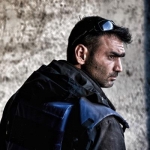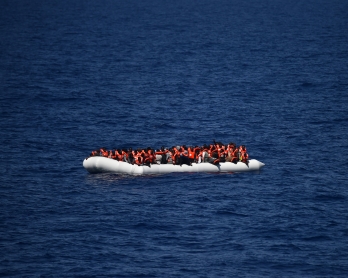Stepping on bodies to survive
At sea in the Mediterranean -- It was the purest form of survival instinct that I have ever seen. Undertaking a desperate, crazy journey to survive another day. Stepping on and over dead bodies -- as carefully as chaos would allow -- to save yourself. I’ve covered the refugee crisis for more than a year. But what I saw at sea off the Libyan coast was just crazy, surreal.
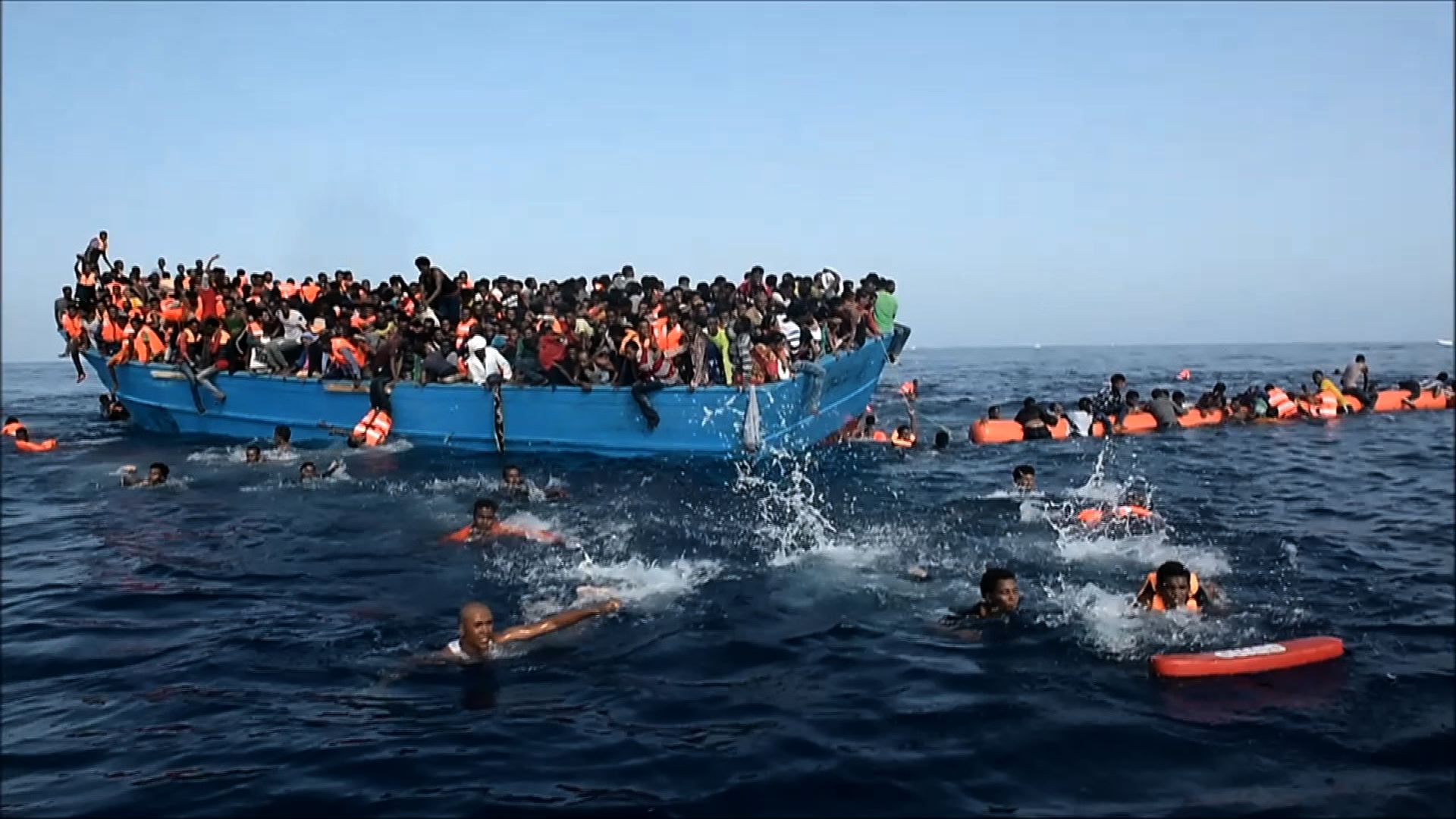
I spent two weeks aboard a 30-meter sailing boat, the Astral, with the Proactiva Open Arms NGO in October, one of a myriad of international non-governmental organizations that are working in the Mediterranean to, quite simply, prevent people stuffed onto vessels from drowning.
For those who don’t know, the situation in the Med at the moment is the following. People fleeing poverty, conflict and repression, mostly from sub-Saharan Africa, make their way to Libya. There, they pay smugglers to put them on boats which they believe will bring them to Europe, in hopes of starting a better life.
The smugglers stuff vessels -- rubber dinghies, old wooden boats, etc, which they then steer to international waters off Libya and abandon. So these people are left to float at sea -- no food, no water, no idea that hundreds of watery kilometers lie between them and Europe. They are picked up, mostly by NGOs but also by the Italian coast guard.
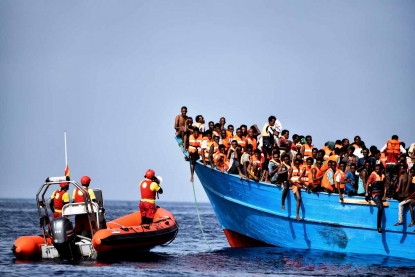 Members of Spanish humanitarian NGO Proactiva Open Arms, try to calm refugees and migrants during a rescue operation off the coast of Libya on October 4, 2016. (AFP / Aris Messinis)
Members of Spanish humanitarian NGO Proactiva Open Arms, try to calm refugees and migrants during a rescue operation off the coast of Libya on October 4, 2016. (AFP / Aris Messinis)When I say that the boats are stuffed with people, I really do mean stuffed. They are so overloaded that sometimes people die because they can’t get enough air to breathe, like what happened on one of the boats that we encountered. Can you imagine that? You die of asphyxiation in the open air…
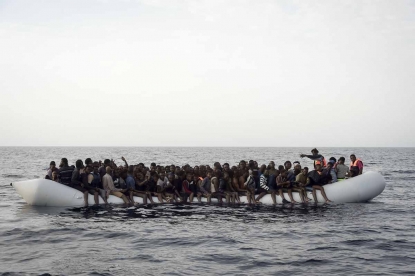 (AFP / Aris Messinis)
(AFP / Aris Messinis)I spent two weeks on the water on the Astral. The first day that I was aboard, we had huge numbers of arrivals -- some 6,000 people found floating on wooden and rubber boats. There were many big ships from NGOs in the area and they managed to pick them all up and took them to Sicily. Astral doesn’t transport migrants, it’s too small of a boat, so we were the only ones left in the area.
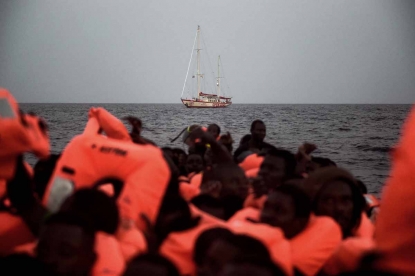 The Astral off the Libyan coast, October 3, 2016.
(AFP / Aris Messinis)
The Astral off the Libyan coast, October 3, 2016.
(AFP / Aris Messinis)At 3 o’clock in the morning we got an alert that more boats were coming. We filled our two RIBs (rigid inflatable boat) with life jackets and set out to search for the vessels. That’s what the Astral does -- it provides these people with life jackets, plucks out of the sea any who fell or jumped in and tries to keep them calm until a big vessel can come to pick them up and transfer them to Italy.
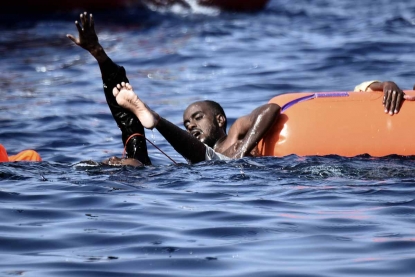 (AFP / Aris Messinis)
(AFP / Aris Messinis)It was completely dark, so it was difficult to see anything, but we saw the first boat about an hour later and went to work.
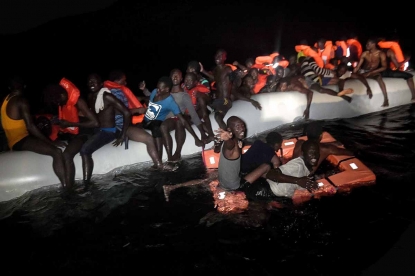 (AFP / Aris Messinis)
(AFP / Aris Messinis)Around 8 o’clock in the morning, we came upon a wooden boat and some rubber boats. The wooden boat has some 1,000 people crammed into three levels. I was on one of the RIBs as it approached and jumped inside to take pictures.
We had begun to give out life jackets and ran out -- we had 2,500 on board but we had given out some the day before, too. Then smoke appeared on the boat from somewhere and people panicked. When people on a boat panic, they move from side to side so much that often the boats capsize. Some people just started jumping into the sea. I managed to get off -- one of the RIBs came close and I jumped inside.
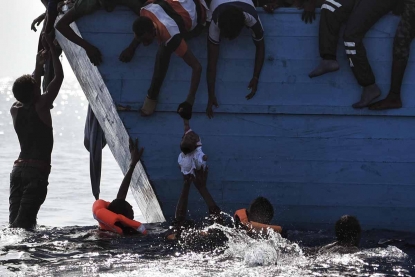 (AFP / Aris Messinis)
(AFP / Aris Messinis)It was chaos -- people were jumping into the sea, screaming, the NGO people were screaming at the migrants to try and keep them calm. I don’t know how, but luckily the boat didn’t capsize. But by that point there were 150 people in the sea. We gave them everything we had -- even the balloons that you keep on the side of a boat for when it docks -- those were given to the migrants so that they wouldn’t drown.
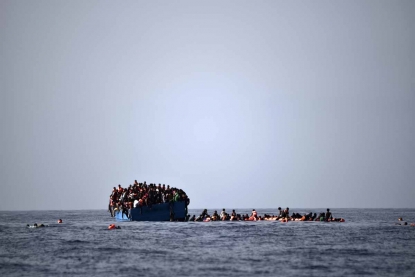 (AFP / Aris Messinis)
(AFP / Aris Messinis)When the situation became a bit calmer, luckily an Italian navy ship showed up. We started transporting people to it -- first the people who didn’t have life jackets. Besides the wooden boat, there were several other boats in the area. When we approached one of them, a rubber boat, we saw that there were more than 200 people aboard. They were in a complete panic and shouted to us that there were dead people on board.
I told the skipper to get closer and when we were close I tried to get a look, but couldn’t see bodies -- it was so stuffed with humanity that you couldn’t see what was in the middle. We started transporting people from it to the Italian ship, around 50 at the time. We did three trips and when we approached it for the last time, that’s when I saw it -- a hill of bodies in the middle.
I was shocked. I jumped in and started taking pictures. The people remaining on the boat had no choice but to step on the dead bodies to get off. They were being as careful as they could, trying to avoid it as much as possible. That scene will stay with me for the rest of my life -- these people, wearing rags, trying not to, but stepping over bodies to get off.
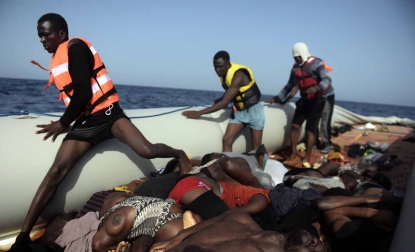 (AFP / Aris Messinis)
(AFP / Aris Messinis)At that point, noone was thinking of what to do with the bodies. We had to rescue the living first. We ended up picking up some 3,000 people. We did a quick count at first and counted 22 bodies, but we knew there were more. We dragged the boat and tied it to the Astral, so we wouldn’t lose it. We finished late at night, around 10 o’clock. We were exhausted.
The next day, we put the bodies in body bags and counted them properly. There ended up being 29. We put them in a raft and dragged it behind us for almost two days, until we could hand them over to the Italian coast guard. The following day the waves were so high that some slipped off and they were floating in the sea. We managed to recover them.
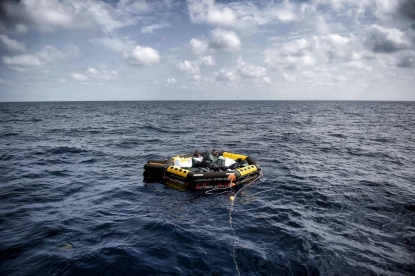 (AFP / Aris Messinis)
(AFP / Aris Messinis)What’s happening off Libya right now is completely crazy. There is no logic in it. These people are undertaking a trip that can’t be completed -- the distance is too large. The smugglers know it. But the people getting into the boats don’t. When we collected the people from the sea, we asked them where they thought they were and they all said that they thought they were close to Italy. When we told them the distance that they actually traveled -- a mere 20 miles or so -- they couldn’t believe it.
I’ve spent months covering the refugee crisis on the Greek islands, but there, the situation had more logic in it. The people getting into the boats in Turkey actually had a chance of making it to Lesbos and the other islands. It was dangerous, sure, and many drowned. But it was a realistic journey. This is not a realistic journey.
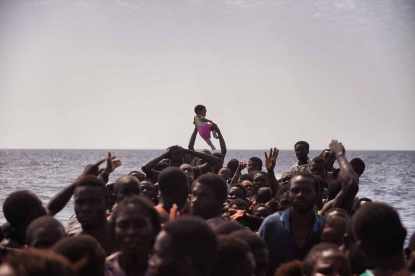 (AFP / Aris Messinis)
(AFP / Aris Messinis)Another difference are the people. In Lesbos, it was mostly middle class people, fleeing war. Here it’s really, really poor people just trying to survive.
They may not be coming from a country officially at war like Syria, but they are desperate and will do anything to live another day. I speak to some of them. They don’t have anything planned for their future, they are just fleeing and trying to survive each day. It’s pure survival instinct. You can see it as soon as you see them. Many of them are literally wearing rags. Some are in their underwear -- can you imagine? Crossing the sea in your underwear. Some are completely naked. They are poor people just trying to survive and it is so sad, when you realize that this is happening.
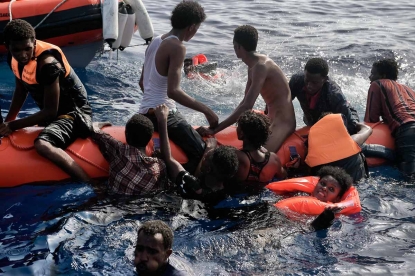 (AFP / Aris Messinis)
(AFP / Aris Messinis)I don’t know what would happen if the NGOs weren’t there. In a way, if the NGOs weren’t there, this situation wouldn’t occur, because the smugglers wouldn’t leave people out there in international waters to be picked up. But who is ready to take the risk of thousands of people drowning before that can happen? The NGOs can’t leave the area because if they do, thousands will drown.
This blog was written with Yana Dlugy in Paris.
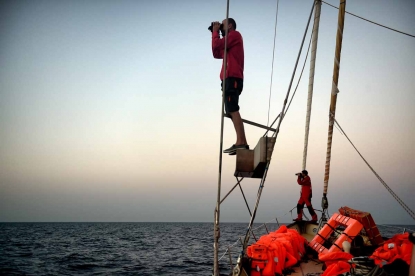 (AFP / Aris Messinis)
(AFP / Aris Messinis)


